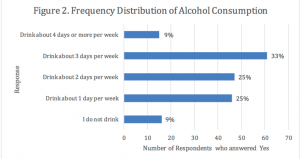When a student enters college, finally abandoning their parents after 18 years they instantly begin their journey to become an adult. College reveals a new world that gives kids a chance to make a new name for themselves as they can express their feelings and beliefs. They are associated with a new group of diverse individuals and must adapt and develop friendships and beneficial relationships. These freshman are given new responsibilities and challenges that they must deal with in order to finally prove their independence and maturity. One of the hardest adjustments for students is the social aspect of college. Lets be real, in college, kids like to party and at these events they are usually drinking. Because of the fun and excitement, sometimes drinking and partying will take over a students life and they begin to put their priorities and schoolwork aside in order to go out and drink with their new friends. Unlike high school their parents can’t influence their decision making and prevent them from consuming alcohol at such a high rate. So this brings me to my question, is there a correlation between a college students grade point average (GPA) and how much they drink.
Drinking alcohol is extremely common among college students and has been over the course of history. For college kids it is easy to get away with drinking whenever they want because they don’t have parental supervision at all times. The more time these kids are drinking the less they are sober which means they will be studying a lot less. If they are less prepared for their classes and exams, they most likely aren’t going to do as well as they could have. Waking up hungover will cause the student to loose motivation and energy which can negatively effect their work ethic and study habits. According to the National Institute on Alcohol Abuse and Alcoholism, if a student is intoxicated from the night before they are 5 times more likely to miss class the following day than a student is sober the night before. Alcohol also has many negative effects on the body. For example, areas of the brain which are responsible for an individuals learning, memory, verbal skills, vision, and cognition are all affected. The heart is affected as heart rates increase and blood pressure rises. Also cancers can develop at a higher risk in the liver, breast, mouth and throat because of the rapid consumption of beer and vodka.Alcohol also increases the risk of sexual assaults, campus violence, death, dropouts, and spread of sexually transmitted diseases. All these factors illustrate the negative consequences of drinking alcohol and how it could impact not only the GPA of a college student but there overall health.
After knowing all the dangers of alcohol consumption, it should be perceived that there is an inverse relationship between alcohol intake and GPA( More one drinks, lower the GPA). After reading a study conducted by Jill Coymen, testing to see how alcohol use affects the academic success of students from the University of New Hampshire. In the study her independent variable was alcohol use and the dependent variable was academic performance. She sampled 223 students, (59 percent female) and (41 percent male), (85 percent being white) with 74 survey questions about drinking habits and academic success. The null hypothesis in this study was there is no difference in GPA for the students who drink alcohol and the students who don’t. The alternative hypothesis is students who abuse alcohol will have lower GPA’s. After analyzing all of the data, Coymen discovered there was no correlation between alcohol abuse and GPA’s of college student, therefor we must accept the null hypothesis. 67 percent of the students drank 2 or more nights a week. A majority of the students had between a 3.0 and a 3.5 which are very satisfying grades in college. Also students with a 3.5 reported drinking 3 days a week.


In a randomized control study, aimed to find a correlation between alcohol consumption and GPA. This study received 113 responses from college students and wanted to determine if students GPA’s would be lower because of alcohol intake. There was 78 percent female and 22 percent male which could in fact lead to some bias data but a majority of them drank alcohol atleast 2 nights of the week in college. Overall, 58 percent of the college students had over a 3.0 and 42 percent had over a 2.0. This illustrates that drinking doesn’t actually destroy a students grades.
This blog isn’t suggesting that if you drink more your GPA will rise, because there is no way that statement is true but it does reveal that just because you necessarily consume alcohol your grades won’t drop. I believe that students can spend there free time doing whatever they please as long as they can manage their time, go to class, and study for exams. Consuming alcohol is dangerous and can negatively impact a student like causing their GPA to drop and fail out of school. Going out an enjoying yourself is part of the college experience as long as that student can get it done in the classroom first.


I think a large part of this is the fact that 2/3rds of college students already report drinking. I’m sure this number is actually larger and many students are just afraid to say anything. Because of this, the average GPA is already mostly weighted for the effects of drinking. Furthermore, there are potentially confounding 3rd variables like the fact that students who more often get highly intoxicated were ones that care less about academics and therefore get lower grades naturally. In fact, this study (http://www.tandfonline.com/doi/abs/10.1080/09687630512331323521) shows there tobe a correlation between binge drinking and motivation, a large contributor to class performance.